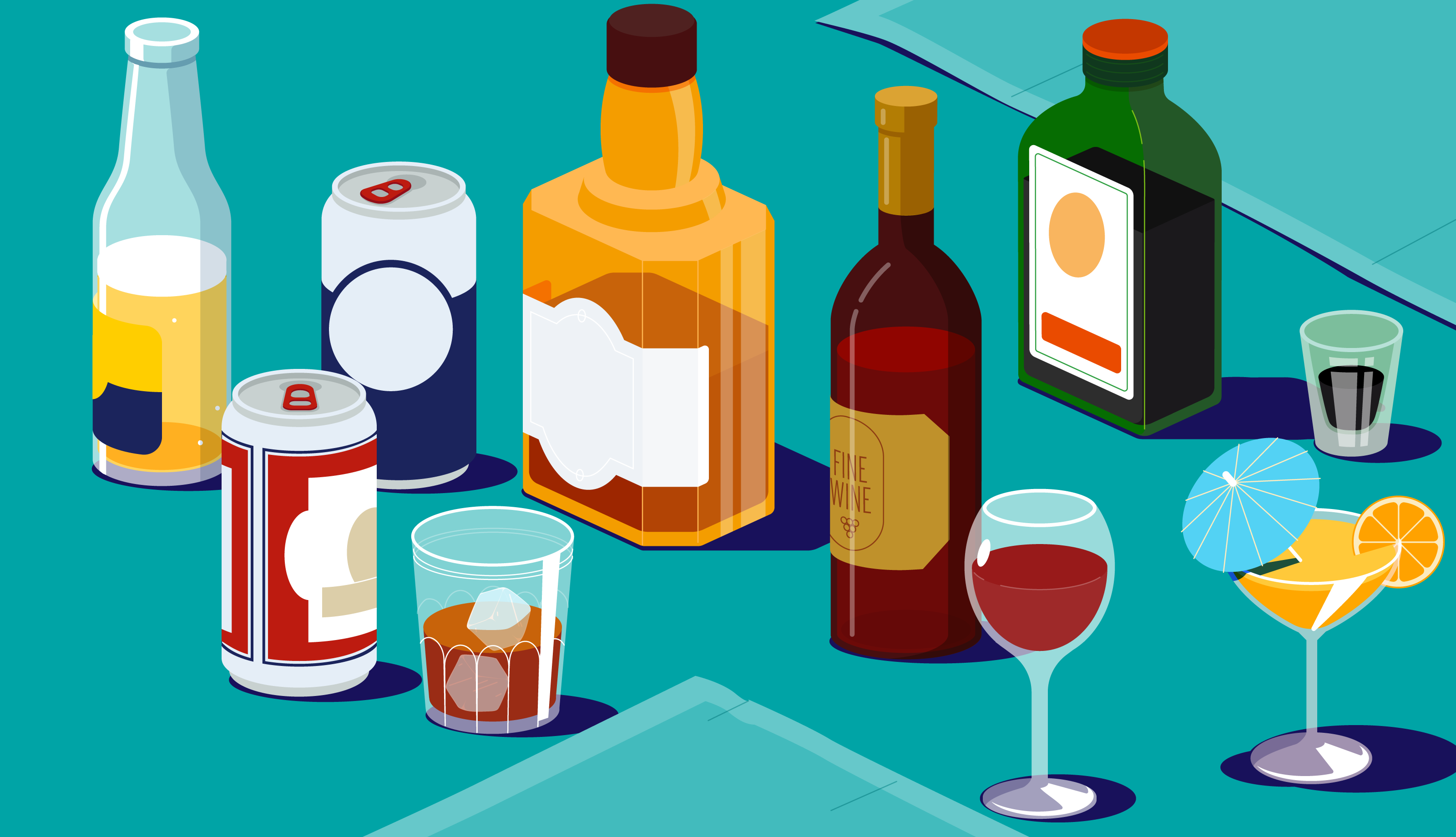Does a glass of your favorite wine give you a flush? Or maybe that beloved pint of beer suddenly turns into a stuffed nose? Then you might have developed a sudden intolerance to alcohol.
Many people think that alcohol allergy and alcohol intolerance are the same thing, but they’re not. In fact, only alcohol intolerance causes the alcohol flush reaction. When people search for alcohol allergy, most people actually mean alcohol intolerance, and this is what we’re discussing today.
Table of contents
- 1. What is alcohol intolerance?
- 2. Alcohol intolerance symptoms
- 3. Causes of intolerance to alcohol and related risks
- 4. Alcohol intolerance diagnosis
- 5. Can alcohol intolerance be cured?
In this article, we explain the genetic causes of alcohol intolerance, other components of alcohol that can cause reactions, the symptoms of alcohol sensitivity, diseases associated with alcohol intolerance, and how to manage this condition.
☝️DISCLAIMER☝This article is for informational purposes only. It is not intended to constitute or be a substitute for professional medical advice, diagnosis, or treatment.
What is alcohol intolerance?
Alcohol intolerance is a genetic metabolic disorder that is triggered by consuming alcohol. The culprit is a substance called acetaldehyde — a toxic product of alcohol metabolism that is produced in the body as it breaks down the alcohol in your system.
Alcohol intolerance starts in the liver. Your body uses enzymes to neutralise alcohol. First, alcohol is turned into acetaldehyde. Then, the ALDH2 enzyme (aldehyde dehydrogenase 2) neutralises it so it can be removed from your body.
People with alcohol intolerance have enzymes that don’t work fast enough or don’t work together, so acetaldehyde accumulates. Sadly, when there’s too much acetaldehyde in your bloodstream, it has side effects, which are the symptoms of alcohol intolerance (e.g., nausea, flushing, hives, etc.).
Your DNA determines the speed at which your enzymes work, and this is what causes the problem in alcohol intolerance:
- Your acetaldehyde-neutralising enzymes work more slowly, so it takes longer for this substance to be broken down and removed from your body.
- Your enzymes aren’t synched - if the enzymes that turn alcohol into acetaldehyde and the ones that then neutralise acetaldehyde are misaligned, the acetaldehyde can build-up.
Alcohol intolerance is associated with a combination of specific ADH1B and ALDH2 gene variants that influence your alcohol-neutralising enzymes. These gene variants are most commonly detected in people of East Asian descent where alcohol intolerance is a common problem.
☝️TIP☝️ Discover your genetic predisposition to alcohol intolerance (and lactose/gluten intolerance) with the Atlas DNA Test.
Alcohol intolerance symptoms
Signs of alcohol intolerance are not limited to just flushing and hives. The symptoms of alcohol intolerance that manifest even after ingesting small amounts of alcohol include:
- Flushing
- Hives
- Blocked or runny nose
- Nausea and vomiting
- Diarrhoea
- Worsening of asthma
- Low blood pressure
- Heart palpitations
- Drowsiness
☝️Alcohol intolerance vomiting☝️ Alcohol intolerance is not the only cause of vomiting. If you drink too much alcohol, acetaldehyde is a toxic substance can cause vomiting in healthy (but intoxicated) people too.
Other causes of intolerance to alcohol

So what if you’ve taken a DNA test and you don’t have the gene variants, can you develop alcohol intolerance? That’s an excellent question. There are other substances in alcohol that can cause your body to react.
For example, some sudden alcohol intolerance causes are related to the onset of specific diseases or sensitivities to certain components found in alcoholic beverages. Indirect alcohol intolerance causes include:
| Gluten intolerance | Histamine intolerance |
| Sulfite sensitivity | Medication that interacts with alcohol |
If you experience an alcohol flush reaction only sometimes, it could be related to the specific alcohol you are drinking. For example, red wine and beer contain higher levels of sulfites and histamines, so if you are sensitive to these substances, it might be worth finding alternatives that don’t trigger your immune system.
☝️Allergy to alcohol☝️ Allergic reactions that are triggered by alcohol aren’t caused by alcohol, but by other ingredients in the beverage (like gluten-containing grains used to make beer).
Diseases that cause alcohol intolerance
Bad reactions to alcohol and alcohol intolerance can be also characteristic of some diseases. However, just because you feel ill after drinking alcohol doesn’t mean you’re sick. If you have any concerns about your health, always consult a doctor ( not Google).
-
Hodgkin lymphoma alcohol reaction: research shows that 1.5–5% of people with this cancer have a sudden onset alcohol intolerance that causes pain after ingesting alcohol.
-
Tumors of female organs: studies show that women with uterine tumours are more susceptible to alcohol reactions, followed by ovary and breast tumours.
-
Gilbert’s syndrome and alcohol intolerance: patients with this mild, hereditary liver condition may find that drinking alcohol causes brain fog, fatigue, jaundice, and severe hangovers.
-
Menopause and alcohol intolerance: drinking has been shown to worsen the symptoms of menopause by intensifying hot flushes and night sweats.
Alcohol intolerance test

If you have the trademark sudden alcohol flush reaction when you drink, then you might want to consult your doctor. Alcohol intolerance is diagnosed based on the main clinical signs reported by the patient:
- immediate flush reaction, followed by a headache after drinking one or two alcoholic beverages
The doctor will ask you about the reactions you experience and the context, so it might be helpful to record your symptoms in a diary, including what you ate, drank, and at what time. In addition to a patient history and a physical exam, your GP might ask you to take these tests:
- Skin prick test to check if you have any allergies to substances found in alcohol.
- Blood allergy test to check for antibodies associated with allergic reactions.
☝️TIP☝️ If you’ve taken the Atlas DNA Test, you can show them your results for alcohol intolerance too.
Is there an alcohol intolerance cure?
There is no alcohol intolerance cure. The only way to manage this condition is to abstain from alcohol. On top of that, your doctor may recommend avoiding tobacco (including second-hand smoke), which can add to the acetaldehyde levels in your body.
However, if developing alcohol intolerance was caused by other health conditions, like Hodgkin’s lymphoma, you won’t need alcohol intolerance treatment because when the disease is treated, alcohol intolerance goes away.
Just remember that alcohol intolerance can increase the risk of serious health conditions if you continue drinking. Even if you don’t have alcohol intolerance, drinking high levels of alcohol frequently is also dangerous for your health. So all in all, moderation is your friend.
- Cleveland Clinic, Alcohol intolerance
- Andrew J. Bryant, Alcohol intolerance associated with Hodgkin lymphoma, 2013
- Cancer Research UK, Hodgkin lymphoma symptoms
- T. B. Brewin, The incidence of alcohol intolerance in women with tumours of the uterus, ovary or breast
1967 - Gilbert’s syndrome affects how your body deals with alcohol and other drugs, 2012
- What to expect when you’re expecting the menopause
- Jonas Strömberg, Cholecystectomy in Patients with Liver Cirrhosis, 2015
- W H Lyle, Dimethylformamide and alcohol intolerance, 1979
- Philip J Brooks,The Alcohol Flushing Response: An Unrecognized Risk Factor for Esophageal Cancer from Alcohol Consumption, 2009
- Tatiana V. Morozova et al, Genetics and genomics of alcohol sensitivity, 2014
- H. Werner Goedde, Population Genetic Studies on Aldehyde Dehydrogenase Isozyme Deficiency and Alcohol Sensitivity, 1983
- Sarah J Lewis, Alcohol, ALDH2, and esophageal cancer: a meta-analysis which illustrates the potentials and limitations of a Mendelian randomization approach, 2005


















